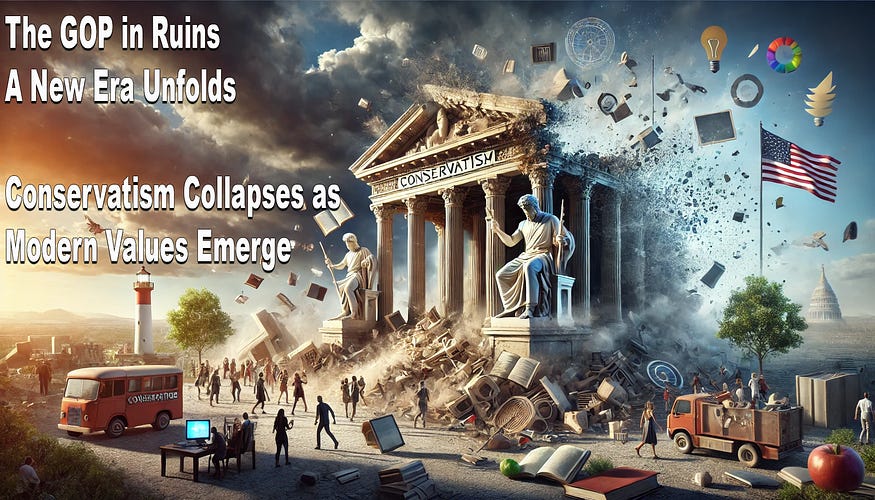The GOP in Ruins: A New Era Unfolds
Witness the Transformation: Conservatism Collapses as Modern Values Emerge
The Republican Party has shifted from being the conservative party to a “one man cult of Trump”.
The statement that the Republican Party has shifted from being the conservative party to a “one man cult of Trump” is a perspective shared by many political analysts and commentators.
Here’s an analysis of this viewpoint with supporting points:
Evolution of the Republican Party
1. Traditional Conservatism:
- Historically, the Republican Party has championed traditional conservative values such as limited government, free-market economics, strong national defense, and individual liberties. Key figures such as Ronald Reagan and George H.W. Bush embodied these principles, promoting fiscal responsibility, lower taxes, and a robust foreign policy.
2. Shift Under Trump:
- Donald Trump’s ascendancy to the presidency in 2016 marked a significant shift in the party’s identity. His unorthodox style, populist rhetoric, and policy positions diverged from traditional conservative tenets. Trump emphasized immigration restrictions, trade protectionism, and a strong nationalist agenda, which resonated with a broad base of the Republican electorate but diverged from traditional conservative principles.
Cult of Personality
Loyalty to Trump:
- Trump’s influence within the party has been profound. Many Republican politicians have aligned themselves closely with Trump, fearing political backlash from his loyal base if they dissent. This loyalty is often characterized as a “cult of personality,” where Trump’s personal brand and charisma overshadow traditional policy discussions and ideological coherence.
Primary Challenges:
- Republicans who have criticized Trump or distanced themselves from his approach have often faced primary challenges and significant political pressure. For instance, figures like Senator Mitt Romney and Representative Liz Cheney have faced backlash and censure from within the party for their criticism of Trump and their votes to impeach him.
Impact on Policy and Governance
Policy Shifts:
- Under Trump’s leadership, the Republican Party has seen shifts in policy focus. Issues like immigration, trade, and deregulation have taken center stage, sometimes at the expense of traditional conservative priorities like fiscal conservatism and global free trade.
- Trump’s tax cuts and deregulatory measures align with conservative economic principles, but his trade wars and tariffs represent a significant departure from the free-market ideology.
Electoral Strategy:
- The party’s electoral strategy has also shifted to prioritize Trump’s base, focusing on issues that resonate with his supporters, such as election security and immigration, often employing populist and nationalist rhetoric.
Reactions and Criticisms
Internal Party Divisions:
- The shift has caused internal divisions within the Republican Party. Traditional conservatives and establishment figures sometimes clash with Trump-aligned populists, creating a factional landscape within the party.
- The Republican National Committee (RNC) and various state parties have often taken actions to solidify Trump’s influence, such as censuring members who vote against Trump’s interests.
Public Perception:
- Public perception of the Republican Party has been significantly influenced by Trump’s tenure. Supporters view him as a transformative figure who has revitalized the party, while critics see the party’s shift as a move away from principled conservatism towards personality-driven politics.
Conclusion
The Republican Party’s transformation under Donald Trump reflects a shift from traditional conservative principles towards a focus on Trump’s personality and agenda. This change has sparked debates about the future direction of the party and its identity. While Trump’s influence remains strong, the long-term impact on the party’s core values and electoral strategy continues to evolve.


